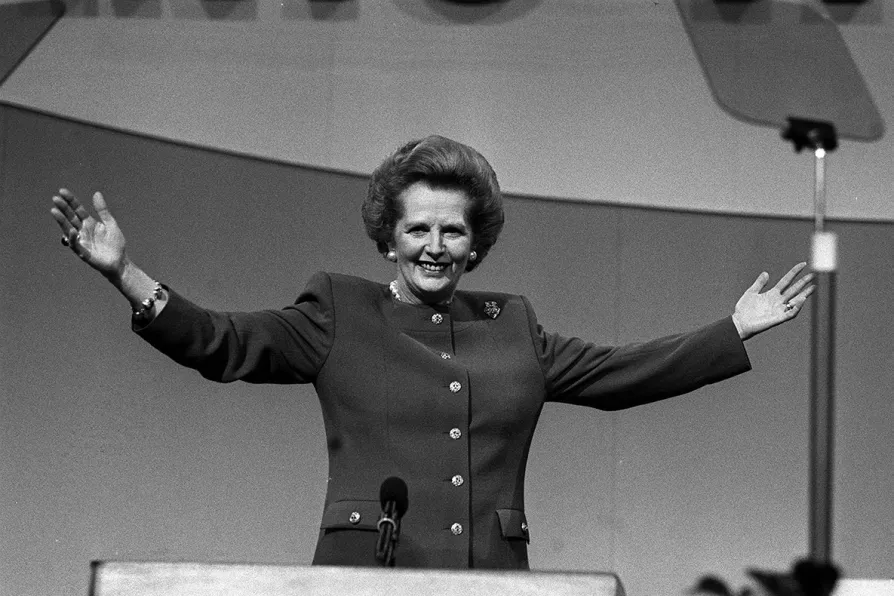
 Prime Minister Margaret Thatcher acknowledges the standing ovation after her keynote speech at the end of the 1988 Conservative Party conference in Brighton
Prime Minister Margaret Thatcher acknowledges the standing ovation after her keynote speech at the end of the 1988 Conservative Party conference in Brighton
THIS weekend the Morning Star conference in London will discuss how we turn rising industrial and political militancy into a nationwide fightback.
It’s a long time since Britain looked less democratic than it does today, with Westminster not only setting its face against the public in almost every policy field but working to silence and criminalise opposition.
Polls show the NHS crisis and the soaring cost of living top popular concerns. Yet government and opposition oppose restorative pay rises for workers after 15 years of decline. Both are committed to deepen NHS dependence on the private sector, accelerating the very policies that have driven it to the brink.
The public want to own our water and energy supplies. But a crooked political elite thoroughly enmeshed with parasitical business “investors” blocks off these popular policies, shutting its ears to outrage at the poisoning of our waterways, the obscene profiteering of the oil and gas giants, transport and postal systems driven to dysfunction by the greed of short-term shareholders.
The public want action on climate change too, whether investment to insulate homes, serious plans to reduce fossil fuel emissions or measures to protect communities from the growing risk of fire and flood. We aren’t being offered it: Labour’s latest U-turn brazenly prioritising the zombie economics of a discredited elite over investment in a sustainable future.
And the public want peace. When the movement for a Gaza ceasefire can rally hundreds of thousands to the streets week after week, why is this not reflected in our elected Parliament?
Why is the government still looking at new ways to ban protest — with the support of a Labour opposition that continues to deselect, suspend and purge members for showing solidarity with Palestine?
Our fightback conference is hooked on the 40th anniversary of the miners’ strike.
The roots of today’s crises across the economy lie in the Thatcher years, when the Conservative Party unleashed a ferocious war on the working class.
The miners’ strike was the biggest confrontation between capital and labour of that decade. For over a year the heroism, courage and inventiveness of striking miners, their families and their supporters showed solidarity at its finest.
But the miners were also let down, by a failure of the wider movement to adequately meet the challenge of Thatcher’s offensive, by a Labour Party leadership that wouldn’t stand with them and by divisions and infighting within the left.
Following defeat the pace of privatisations sped up, and the British people lost control of our oil and gas, electricity and water, steel, coal, communications infrastructure and more.
The share of GDP paid in wages has since steadily declined, that taken in profits and rents risen. This is the economic model that needs to be overturned.
The appetite for a fresh start was demonstrated by the mass enthusiasm for the Corbyn project. More recently, the strike wave and the huge Gaza demos show a spirit of defiance that Westminster is desperate to crush.
But there is no reason at all for unions, on the front foot after a year of pay victories, to settle for the more-of-the-same future that is all Labour currently offers: nor for a left whose policies enjoy majority support to tolerate the right-wing stranglehold on our politics and media.
Indeed, unions are already giving a lead in taking the policies the parties won’t into communities, from Unite’s Save Our Steel campaign to RMT’s recent day of action against rail cuts.
Turning Britain around will require co-ordinated, unified resistance.
The Morning Star is not the only force on the left engaged with this: next weekend sees the Arise conference A World To Win, the one after that War On Want’s “festival of solidarity and resistance,” all grappling with the practicalities of the battle for a better future. We have work to do: join us!

The Gala’s core message of working-class solidarity offers renewed hope and provides the antidote to the anti-worker policies of Reform UK, argues IAN LAVERY MP













